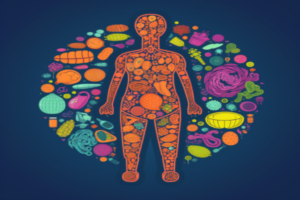Introduction:
Understanding the intricacies of gut health and the role of the microbiome is essential for maintaining overall well-being. The gut microbiome, a complex community of microorganisms residing in your digestive tract, influences various aspects of your health, including digestion, immunity, metabolism, and even mental well-being. In this comprehensive guide, we will delve into the world of gut health, explaining the fundamentals of the microbiome, the factors that influence its balance, and practical tips for nurturing a healthy gut. By unraveling the mysteries of your microbiome and adopting gut-friendly habits, you can optimize your digestive health and support your overall wellness.
1. The Gut Microbiome: An Overview:
The gut microbiome refers to the vast and diverse collection of microorganisms, including bacteria, viruses, fungi, and other microbes, that inhabit your gastrointestinal tract. Composed of trillions of microorganisms, the microbiome is unique to each individual, influenced by factors such as genetics, diet, environment, and lifestyle.
2. The Significance of Gut Health:
A healthy gut microbiome is crucial for maintaining overall well-being. It plays a vital role in digestion, nutrient absorption, and the synthesis of vitamins. Additionally, the gut microbiome supports a robust immune system, influences metabolism, and even affects mood and brain function. Imbalances in the microbiome, known as dysbiosis, have been associated with various health conditions, including gastrointestinal disorders, autoimmune diseases, obesity, and mental health disorders.
3. Factors Influencing the Microbiome:
Several factors can influence the composition and diversity of the gut microbiome:
- Diet: Your dietary choices significantly impact the microbiome. A diet rich in fiber, fruits, vegetables, whole grains, and fermented foods promotes the growth of beneficial bacteria. On the other hand, a diet high in processed foods, added sugars, and unhealthy fats can disrupt the microbial balance.
- Antibiotics and Medications: While antibiotics are vital for fighting infections, they can also disturb the balance of the microbiome by indiscriminately killing both harmful and beneficial bacteria. Other medications, such as proton pump inhibitors and non-steroidal anti-inflammatory drugs (NSAIDs), can also affect the microbiome.
- Stress: Chronic stress can disrupt the gut-brain axis, leading to changes in gut motility, permeability, and the composition of the microbiome. This bidirectional communication between the gut and the brain can impact digestive health.
- Lifestyle Factors: Sleep patterns, physical activity levels, and exposure to environmental factors also influence the microbiome. Lack of quality sleep, sedentary lifestyles, and exposure to environmental toxins can disrupt the microbial balance.
4. Nurturing a Healthy Microbiome:
To promote a healthy gut microbiome, incorporate the following practices into your lifestyle:
- Balanced Diet: Emphasize a diverse and balanced diet that includes plenty of fiber-rich foods, such as fruits, vegetables, whole grains, legumes, and nuts. Fiber acts as a prebiotic, providing nourishment for beneficial bacteria in the gut.
- Fermented Foods: Incorporate fermented foods into your diet, such as yogurt, kefir, sauerkraut, kimchi, and kombucha. These foods contain probiotics, which introduce beneficial bacteria into the gut.
- Probiotic Supplements: Consider taking probiotic supplements that contain specific strains of beneficial bacteria. However, consult with a healthcare professional to determine the appropriate strains and dosage for your individual needs.
- Minimize Processed Foods and Added Sugars: Reduce your intake of highly processed foods and foods high in added sugars, as they can negatively affect the diversity and balance of the microbiome.
- Healthy Fats: Include sources of healthy fats in your diet, such as avocados, olive oil, nuts, and fatty fish like salmon. These fats support a healthy gut lining and provide anti-inflammatory benefits.
- Manage Stress: Engage in stress-reducing activities like meditation, deep breathing exercises, yoga, or hobbies that bring you joy. Stress management techniques can positively impact the gut-brain axis and support a healthy microbiome.
- Regular Physical Activity: Engage in regular exercise, as it promotes healthy gut motility and overall well-being. Aim for a combination of cardiovascular exercises, strength training, and flexibility exercises.
- Quality Sleep: Prioritize sleep and establish a consistent sleep routine. Aim for 7-8 hours of quality sleep each night to support optimal gut health.
5. Prebiotics and Postbiotics:
In addition to probiotics, prebiotics and postbiotics are important for gut health:
- Prebiotics: Prebiotics are types of dietary fiber that act as food for beneficial bacteria in the gut. They are found in foods like onions, garlic, bananas, asparagus, oats, and legumes. Including prebiotic-rich foods in your diet helps nourish the beneficial bacteria, supporting their growth and diversity.
- Postbiotics: Postbiotics are the byproducts of the fermentation process carried out by the gut bacteria. They include short-chain fatty acids (SCFAs) and other metabolites that have beneficial effects on gut health. Consuming fiber-rich foods and fermented foods can help increase the production of postbiotics.
6. When to Seek Professional Help (150 words):
If you experience persistent digestive issues, unexplained weight changes, or significant changes in bowel habits, it is important to consult a healthcare professional. They can assess your symptoms, perform necessary tests, and provide appropriate guidance and treatment options tailored to your specific needs.
Conclusion:
Understanding the importance of gut health and nurturing a healthy gut microbiome is key to optimizing overall well-being. By implementing practical strategies such as maintaining a balanced diet, managing stress, getting quality sleep, and engaging in regular physical activity, you can positively influence the diversity and balance of your microbiome. Remember, small changes can have a profound impact on your gut health, leading to improved digestion, enhanced immune function, and better overall health. Embrace the power of your microbiome and make conscious choices to support a thriving gut ecosystem for a healthier and happier life.







